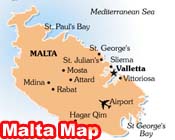Maltese asked to broaden search after refugee sea tragedy
 Valletta, Malta - The UN refugee agency asked the Maltese authorities Thursday to broaden the search for those missing in what is believed to be one of the deadliest incidents involving would-be illegal immigrants in the Mediterranean.
Valletta, Malta - The UN refugee agency asked the Maltese authorities Thursday to broaden the search for those missing in what is believed to be one of the deadliest incidents involving would-be illegal immigrants in the Mediterranean.
In a statement, the UNHCR urged the Maltese authorities to provide medical care to eight African migrants rescued in an incident which is believed to have left at least 70 people missing and feared dead.
Three bodies have been spotted so far by rescuers. If no more survivors are found, it would be one of the worst losses at sea involving people trying to reach Europe from North Africa, the UNHCR said.
On Wednesday, the head of the UNHCR office in Malta Neil Falzon spoke with two of the eight male survivors, including a 15-year-old boy.
The two said their boat set off from the coast of Libya on August 21 with 78 passengers on board, mainly of Somali, Eritrean and Sudanese origin.
On Monday, they capsized in rough conditions. Eight people managed to hang on to the boat, but the rest of the passengers - including four women, three of them pregnant
- were swept away.
On Tuesday night, the survivors were picked up by a Maltese fishing boat, which transferred them to a Maltese naval vessel. They are now being held in detention centres on Malta.
Falzon found the survivors to be in poor physical and mental condition after their ordeal on the high seas and subsequent detention.
The UN refugee agency said it believes that these deeply traumatized people, who may include refugees and asylum seekers, should not be held any longer. They should be released into medical care and given adequate support, including proper counselling.
UN Deputy High Commissioner for Refugees Craig Johnstone said he was shocked by the loss of life.
"I am deeply saddened by this latest tragedy," Johnstone said in Geneva. "This terrible loss of life highlights the urgent need for a concerted international effort aimed at addressing root causes of migration and at offering international protection to those in need." (dpa)